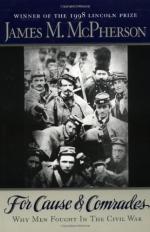
|
| Name: _________________________ | Period: ___________________ |
This test consists of 5 short answer questions, 10 short essay questions, and 1 (of 3) essay topics.
Short Answer Questions
1. By 1864, when a captain in the 5th Alabama wrote of the burning of Chambersburg, how much money did he say soldiers demanded from their victims' houses?
2. During the discussion of the American volunteers in the Spanish Civil War, what percentage found that "belief in war aims" helped overcome the fear of battle?
3. Which most notorious massacre of black prisoners happened on April 12, 1864?
4. In the discussion of Lincoln's idea that the United States represented the last best hope for the survival of republican government, the world is bestrode by all BUT WHICH of these?
5. In 1862, after two friends had been killed in an ambush in the Shenandoah Valley, a soldier from which state wrote "we are to take no prisoners after this"?
Short Essay Questions
1. Under what conditions were black soldiers allowed to join the Confederate army during the final year of the Civil War?
2. What challenges did soldiers face in the last year of the Civil War that exacerbated their combat exhaustion?
3. Explain the phenomenon of "dry rot," as discussed in "Chapter 10: We Know That We Are Supported at Home."
4. Why are there no letters from black Union soldiers, according to "Chapter 9: Slavery Must be Cleaned Out"?
5. In "Chapter 10: We Know That We are Supported at Home," why did some officers worry that married men made bad soldiers?
6. How did Northern soldiers initially respond when Lincoln issued the Emancipation Proclamation?
7. When McPherson discusses the extra incentive Confederate soldiers had to keep fighting, what does he say about the Northern opinion of Southern soldiers?
8. Why, in the discussion of the mail service, does McPherson say that efficient mail delivery was so important?
9. In what way did the Confederate soldiers identify with the Founding Fathers in the discussion of the concept of liberty?
10. What was meant when some soldiers wrote home about being stuck in a "rich man's war," toward the end of "Chapter 7: On the Altar of My Country"?
Essay Topics
Write an essay for ONE of the following topics:
Essay Topic 1
In a well-developed essay, compare and contrast military discipline between the Civil War and one more modern conflict. Include supporting information from the text and outside research as necessary.
Essay Topic 2
In a well-developed essay, compare and contrast the Northern concept of liberty with that of the Southern version of liberty. In what two major ways do their interpretations differ? Be sure to include supporting information from the text.
Essay Topic 3
In a well-developed essay, analyze and discuss the effect being in the presence of slavery had on non-abolitionist Union soldiers. Include quotes and supporting information from the text.
|
This section contains 1,194 words (approx. 4 pages at 300 words per page) |

|




